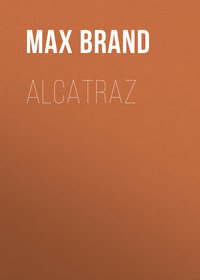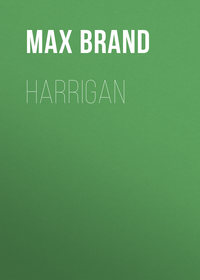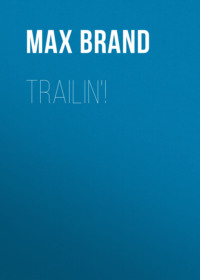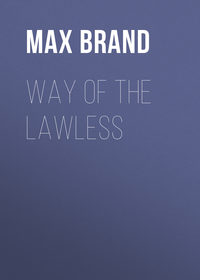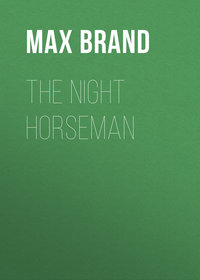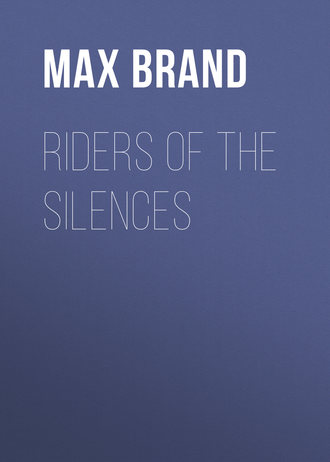 полная версия
полная версияRiders of the Silences
For the moment Pierre said, "The game stops now," the calm which had been with him was gone. It was like the scent of blood to the starved wolf. The last word was scarcely off his tongue when he was crouched with a devil of green fury in his eyes—the light struck his hair into a wave of flame—his face altered by a dozen ugly years.
"D'you mean?" whispered Hurley, as if he feared to break the silence with his full voice.
"Get out of the room."
And the impulse of Hurley, plainly enough, was to obey the order, and go anywhere to escape from that relentless stare. His glance wavered and flashed around the circle and then back to Red Pierre, for the expectancy of the crowd forced him back.
When the leader of the pack springs and fails to kill, the rest of the pack tear him to pieces. Remembering this, Mac Hurley forced his glance back to Pierre. Moreover, there was a soft voice from behind, and he remembered Diaz.
All this had taken place in the length of time that it takes a heavy body to totter on the brink of a precipice or a cat to regain its feet after a fall. After the voice of Diaz there was a sway through the room, a pulse of silence, and then three hands shot for their hips—Pierre, Diaz, and Hurley.
No stop-watch could have caught the differing lengths of time which each required for the draw. The muzzle of Hurley's revolver was not clear of the holster—the gun of Diaz was nearly at the level when Pierre's weapon exploded at his hip. The bullet cut through the wrist of Hurley. Never again would that slender, supple hand fly over the cards, doing things other than they seemed. He made no effort to escape from the next bullet, but stood looking down at his broken wrist; horror for the moment gave him a dignity oddly out of place with his usual appearance. He alone in all the room was moveless.
The crowd, undecided for an instant, broke for the doors at the first shot; Pierre le Rouge pitched to the floor as Diaz leaped forward, the revolver in either hand spitting lead and fire.
It was no bullet that downed Pierre but his own cunning. He broke his fall with an outstretched left hand, while the bullets of Diaz pumped into the void space which his body had filled a moment before.
Lying there at ease, he leveled the revolver, grinning with the mirthless lust of battle, and fired over the top of the table. The guns dropped from the hands of huge Diaz. He caught at his throat and staggered back the full length of the room, crashing against the wall. When he pitched forward on his face he was dead before he struck the floor.
Pierre, now Red Pierre, indeed, rose and ran to the fallen man, and, looking at the bulk of the giant, he wondered with a cold heart. He knew before he slipped his hand over the breast of Diaz that this was death. Then he rose again and watched the still fingers which seemed to be gripping at the boards. These he saw, and nothing else, and all he heard was the rattling of the wind of winter, wrenching at some loose shingle on the roof, and he knew that he was alone in the world, for he had put out a life.
He found a strange weight pulling down his right hand, and started when he saw the revolver. He replaced it in the holster automatically, and in so doing touched the barrel and found it warm.
Then fear came to Pierre, the first real fear of his life. He jerked his head high and looked about him. The room was utterly empty. He tiptoed to the door and found even the long bar deserted, littered with tall bottles and overturned glasses. The cold in his heart increased. A moment before he had been hand in hand with all the mirth in that place.
Now the men whose laughter he had repeated with smiles, the men against whose sleeves his elbow had touched, were further away from him than they had been when all the snow-covered miles from Morgantown to the school of Father Victor had laid between them. They were men who might lose themselves in any crowd, but he was set apart with a brand, even as Hurley and Diaz had been set apart that eventful evening.
He had killed a man. That fact blotted out the world. He drew his gun again and stole down the length of the bar. Once he stopped and poised the weapon before he realized that the white, fierce face that squinted at him was his own reflection in a mirror.
Outside the door the free wind caught at his face, and he blessed it in his heart, as if it had been the touch of the hand of a friend. Beyond the long, dark, silent street the moor rose and passed up through the safe, dark spaces of the sky.
He must move quickly now. The pursuit was not yet organized, but it would begin in a space of minutes. From the group of half a dozen horses which stood before the saloon he selected the best—a tall, raw-boned nag with an ugly head. Into the saddle he swung, wondering faintly that the theft of a horse mattered so little to him. His was the greatest sin. All other things mattered nothing.
Down the long street he galloped. The sharp echoes flew out at him from every unlighted house, but not a human being was in sight. So he swung out onto the long road which wound up through the hills, and beside him rode a grim brotherhood, the invisible fellowship of Cain.
The moon rose higher, brighter, and a grotesque black shadow galloped over the snow beside him. He turned his head sharply to the other side and watched the sweep of white hills which reached back in range after range until they blended with the shadows of night.
The road faded to a bridle path, and this in turn he lost among the windings of the valley. He was lost from even the traces of men, and yet the fear of men pursued him. Fear, and yet with it there was a thrill of happiness, for every swinging stride of the tall, wild roan carried him deeper into freedom, the unutterable fierce freedom of the hunted.
CHAPTER 7
All life was tame compared with this sudden awakening of Pierre. He had killed a man. For fear of it he raced the tall roan furiously through the night.
He had killed a man. For the joy of it he shouted a song that went ringing across the blank, white hills. What place was there in Red Pierre for solemn qualms of conscience? Had he not met the first and last test triumphantly? The oldest instinct in creation was satisfied in him. Now he stood ready to say to all the world: Behold, a man!
Let it be remembered that his early years had been passed in a dull, dun silence, and time had slipped by him with softly padding, uneventful hours. Now, with the rope of restraint snapped, he rode at the world with hands, palm upward, asking for life, and that life which lies under the hills of the mountain-desert heard his question and sent a cold, sharp echo back to answer his lusty singing.
The first answer, as he plunged on, not knowing where, and not caring, was when the roan reeled suddenly and flung forward to the ground. Even that violent stop did not unseat Red Pierre. He jerked up on the reins with a curse and drove in the spurs. Valiantly the horse reared his shoulders up, but when he strove to rise the right foreleg dangled helplessly. He had stepped in some hole and the bone was broken cleanly across.
The rider slipped from the saddle and stood facing the roan, which pricked its ears forward and struggled once more to regain its feet. The effort was hopeless, and Pierre took the broken leg and felt the rough edges of the splintered bone through the skin. The animal, as if it sensed that the man was trying to do it some good, nosed his shoulder and whinnied softly.
Pierre stepped back and drew his revolver. The bullet would do quickly what the cold would accomplish after lingering hours of torture, yet, facing those pricking ears and the trust of the eyes, he was blinded by a mist and could not aim. He had to place the muzzle of the gun against the roan's temple and pull the trigger. When he turned his back he was the only living thing within the white arms of the hills.
Yet, when the next hill was behind him, he had already forgotten the second life which he put out that night, for regret is the one sorrow which never dodges the footsteps of the hunted. Like all his brotherhood of Cain, Pierre le Rouge pressed forward across the mountain-desert with his face turned toward the brave tomorrow. In the evening of his life, if he should live to that time, he would walk and talk with God.
Now he had no mind save for the bright day coming.
He had been riding with the wind and had scarcely noticed its violence in his headlong course. Now he felt it whipping sharply at his back and increasing with each step. Overhead the sky was clear. It seemed to give vision for the wind and cold to seek him out, and the moon made his following shadow long and black across the snow.
The wind quickened rapidly to a gale that cut off the surface of the snow and whipped volleys of the small particles level with the surface. It cut the neck of Red Pierre, and the gusts struck his shoulders with staggering force like separate blows, twisting him a little from side to side.
Coming from the direction of Morgantown, it seemed as if the vengeance for Diaz was following the slayer. Once he turned and laughed in the teeth of the wind, and shook his fist back at Morgantown and all the avenging powers of the law.
Yet he was glad to turn away from the face of the storm and stride on down-wind. Even traveling with the gale grew more and more impossible. The snowdrifts which the wind picked up and hurried across the hills pressed against Pierre's back like a great, invisible hand, bowing him as if beneath a burden. In the hollows the labor was not so great, but when he approached a summit the gale screamed in his ear and struck him savagely.
For all his optimism, for all his young, undrained strength, a doubt began to grow in the mind of Pierre le Rouge. At length, remembering how that weight of gold came in his pockets, he slipped his left hand into the bosom of his shirt and touched the icy metal of the cross. Almost at once he heard, or thought he heard, a faint, sweet sound of singing.
The heart of Red Pierre stopped. For he knew the visions which came to men perishing with cold; but he grew calmer again in a moment. This touch of cold was nothing compared with whole months of hard exposure which he had endured in the northland. It had not the edge. If it were not for the wind it was scarcely a threat to life. Moreover, the singing sounded no more. It had been hardly more than a phrase of music, and it must have been a deceptive murmur of the wind.
After all, a gale brought wilder deceptions than that. Some men had actually heard voices declaiming words in such a wind. He himself had heard them tell their stories. So he leaned forward again and gave his stanch heart to the task. Yet once more he stopped, for this time the singing came clearly, sweetly to him.
There was no doubt of it now. Of course it was wildly impossible, absurd; but beyond all question he heard the voice of a girl come whistling down the wind. He could almost catch the words. For a little moment he lingered still. Then he turned and fought his way into the strong arms of the storm.
Every now and then he paused and crouched to the snow. Usually there was only the shriek of the wind in his ears, but a few times the singing came to him and urged him on. If he had allowed the idea of failure to enter his mind, he must have given up the struggle, but failure was a stranger to his thoughts.
He lowered his head against the storm. Sometimes it caught under him and nearly lifted him from his feet. But he clung against the slope of the hill, sometimes gripping hard with his hands. So he worked his way to the right, the sound of the singing coming more and more frequently and louder and louder. When he was almost upon the source of the music it ceased abruptly.
He waited a moment, but no sound came. He struggled forward a few more yards and pitched down exhausted, panting. Still he heard the singing no longer. With a falling heart he rose and resigned himself to wander on his original course with the wind, but as he started he placed his hand once more against the cross, and it was then that he saw her.
For he had simply gone past her, and the yelling of the storm had cut off the sound of her voice. Now he saw her lying, a spot of bright color on the snow. He read the story at a glance. As she passed this steep-sided hill the loosely piled snow had slid down and carried with it the dead trunk of a fallen tree.
Pierre came from behind and stood over her unnoticed. He saw that the oncoming tree, by a strange chance, had knocked down the girl and pinned her legs to the ground. His strength and the strength of a dozen men would not be sufficient to release her. This he saw at the first glance, and saw the bright gold of her hair against the snow. Then he dropped on his knees beside her.
CHAPTER 8
The girl tossed up her arms in a silent greeting, and Pierre caught the small cold hands and saw that she was only a child of twelve or fourteen trapped by the wild storm sweeping over them. He crouched lower still, and when he did so the strength of the wind against his face decreased wonderfully, for the sharp angle of the hill's declivity protected them. Seeing him kneel there, she cried out with a little wail: "Help me—the tree—help me!" And, bursting into a passion of sobbing, she tugged her hands from his and covered her face.
Pierre placed his shoulder under the trunk and lifted till the muscles of his back snapped and cracked. He could not budge the weight; he could not even send a tremor through the mass of wood. He dropped back beside her with a groan. He felt her eyes upon him; she had ceased her sobs, and looked steadily into his face.
It would have been easy for him to meet that look on the morning of this day, but after that night's work in Morgantown he had to brace his nerve to withstand it.
She said: "You can't budge the tree?"
"Yes—in a minute; I will try again."
"You'll only hurt yourself for nothing. I saw how you strained at it."
The greatest miracle he had ever seen was her calm. Her eyes were wide and sorrowful indeed, but she was almost smiling up to him.
After a while he was able to say, in a faint voice: "Are you very cold?"
She answered: "I'm not afraid. But if you stay longer with me, you may freeze. The snow and even the tree help to keep me almost warm; but you will freeze. Go for help; hurry, and if you can, send it back to me."
He thought of the long miles back to Morgantown; no human being could walk that distance against this wind; not even a strong horse could make its way through the storm. If he went on with the wind, how long would it be before he reached a house? Before him, over range after range of hills, he saw no single sign of a building. If he reached some such place it would be the same story as the trip to Morgantown; men simply could not beat a way against that wind.
Then a cold hand touched him, and he looked up to find her eyes grave and wide once more, and her lips half smiling, as if she strove to deceive him.
"There's no chance of bringing help?"
He merely stared hungrily at her, and the loveliest thing he had ever seen was the play of golden hair beside her cheek. Her smile went out. She withdrew her hand, but she repeated: "I'm not afraid. I'll simply grow numb and then fall asleep. But you go on and save yourself."
Seeing him shake his head, she caught his hands again.
"I'll be unhappy. You'll make me so unhappy if you stay. Please go."
He raised the small hand and pressed it to his lips.
She said: "You are crying!"
"No, no!"
"There! I see the tears shining on my hand. What is your name?"
"Pierre."
"Pierre? I like that name. Pierre, to make me happy, will you go? Your face is all white and touched with a shadow of blue. It is the cold. Oh, won't you go?" Then she pleaded, finding him obdurate: "If you won't go for me, then go for your father."
He raised his head with a sudden laughter, and, raising it, the wind beat into his face fiercely and the particles of snow whipped his skin.
"Dear Pierre, then for your mother?"
He bowed his head.
"Not for all the people who love you and wait for you now by some warm fire—some cozy fire, all yellow and bright?"
He took her hands and with them covered his eyes. "Listen: I have no father; I have no mother."
"Pierre! Oh, Pierre, I'm sorry!"
"And for the rest of 'em, I've killed a man. The whole world hates me; the whole world's hunting me."
The small hands tugged away. He dared not raise his bowed head for fear of her eyes. And then the hands came back to him and touched his face.
She was saying tremulously: "Then he deserved to be killed. There must be men like that—almost. And I—like you still, Pierre."
"Really?"
"I almost think I like you more—because you could kill a man—and then stay here for me."
"If you were a grown-up girl, do you know what I'd say?"
"Please tell me."
"That I could love you."
"Pierre—"
"Yes."
"My name is Mary Brown."
He repeated several times: "Mary."
"And if I were a grown-up girl, do you know what I would answer?"
"I don't dare guess it."
"That I could love you, Pierre, if you were a grown-up man."
"But I am."
"Not a really one."
And they both broke into laughter—laughter that died out before a sound of rushing and of thunder, as a mass slid swiftly past them, snow and mud and sand and rubble. The wind fell away from them, and when Pierre looked up he saw that a great mass of tumbled rock and soil loomed above them.
The landslide had not touched them, by some miracle, but in a moment more it might shake loose again, and all that mass of ton upon ton of stone and loam would overwhelm them. The whole mass quaked and trembled, and the very hillside shuddered beneath them.
She looked up and saw the coming ruin; but her cry was for him, not herself.
"Run, Pierre—you can save yourself."
With that terror threatening him from above, he rose and started to run down the hill. A moan of woe followed him, and he stopped and turned back, and fought his way through the wind until he was beside her once more.
She was weeping.
"Pierre—I couldn't help calling out for you; but now I'm strong again, and I won't have you stay. The whole mountain is shaking and falling toward us. Go now, Pierre, and I'll never make a sound to bring you back."
He said: "Hush! I've something here which will keep us both safe.
Look!"
He tore from the chain the little metal cross, and held it high overhead, glimmering in the pallid light. She forgot her fear in wonder.
"I gambled with only one coin to lose, and I came out tonight with hundreds and hundreds of dollars because I had the cross. It is a charm against all danger and against all bad fortune. It has never failed me."
Over them the piled mass slid closer. The forehead of Pierre gleamed with sweat, but a strong purpose made him talk on. At least he could take all the foreboding of death from the child, and when the end came it would be swift and wipe them both out at one stroke. She clung to him, eager to believe.
"I've closed my eyes so that I can believe."
"It has never failed me. It saved me when I fought two men. One of them I crippled and the other died. You see, the power of the cross is as great as that. Do you doubt it now, Mary?"
"Do you believe in it so much—really—Pierre?"
Each time there was a little lowering of her voice, a little pause and caress in the tone as she uttered his name, and nothing in all his life had stirred Red Pierre so deeply with happiness and sorrow.
"Do you believe, Pierre?" she repeated.
He looked up and saw the shuddering mass of the landslide creeping upon them inch by inch. In another moment it would loose itself with a rush and cover them.
"I believe," he said.
"If you should live, and I should die—"
"I would throw the cross away."
"No, you would keep it; and every time you touched it you would think of me, Pierre, would you not?"
"When you reach out to me like that, you take my heart between your hands."
"And I feel grown up and sad and happy both together. After we've been together on such a night, how can we ever be apart again?"
The mass of the landslide toppled right above them. She did not seem to see.
"I'm so happy, Pierre. I was never so happy."
And he said, with his eyes on the approaching ruin: "It was your singing that brought me to you. Will you sing again?"
"I sang because I knew that when I sang the sound would carry farther through the wind than if I called for help. What shall I sing for you now, Pierre?"
"What you sang when I came to you."
And the light, sweet voice rose easily through the sweep of the wind. She smiled as she sang, and the smile and music were all for Pierre, he knew. Through the last stanza of the song the rumble of the approaching death grew louder, and as she ended he threw himself beside her and gathered her into protecting arms.
She cried: "Pierre! What is it?"
"I must keep you warm; the snow will eat away your strength."
"No; it's more than that. Tell me, Pierre! You don't trust the power of the cross?"
"Are you afraid?"
"Oh, no; I'm not afraid, Pierre."
"If one life would be enough, I'd give mine a thousand times. Mary, we are to die."
An arm slipped around his neck—a cold hand pressed against his cheek.
"Pierre."
"Yes."
The thunder broke above them with a mighty roaring.
"You have no fear."
"Mary, if I had died alone I would have dropped down to hell under my sins; but, with your arm around me, you'll take me with you. Hold me close."
"With all my heart, Pierre. See—I'm not afraid. It is like going to sleep. What wonderful dreams we'll have!"
And then the black mass of the landslide swept upon them.
CHAPTER 9
Down all the length of the mountain-desert and across its width of rocks and mountains and valleys and stern plateaus there is a saying: "You can tell a man by the horse he rides." For most other important things are apt to go by opposites, which is the usual way in which a man selects his wife. With dogs, for instance—a quiet man is apt to want an active dog, and a tractable fellow may keep the most vicious of wolf-dogs.
But when it comes to a horse, a man's heart speaks for itself, and if he has sufficient knowledge he will choose a sympathetic mount. A woman loves a neat-stepping saddle-horse; a philosopher likes a nodding, stumble-footed nag which will jog all day long and care not a whit whether it goes up dale or down.
To know the six wild riders who galloped over the white reaches of the mountain-desert this night, certainly their horses should be studied first and the men secondly, for the one explained the other.
They came in a racing triangle. Even the storm at its height could not daunt such furious riders. At the point of the triangle thundered a mighty black stallion, his muzzle and his broad chest flecked with white foam, for he stretched his head out and champed at the bit with ears laid flat back, as though even that furious pace gave him no opportunity to use fully his strength.
He was an ugly headed monster with a savagely hooked Roman nose and small, keen eyes, always red at the corners. A medieval baron in full panoply of plate armor would have chosen such a charger among ten thousand steeds, yet the black stallion needed all his strength to uphold the unarmored giant who bestrode him, a savage figure.
When the broad brim of his hat flapped up against the wind the moonshine caught at shaggy brows, a cruelly arched nose, thin, straight lips, and a forward-thrusting jaw. It seemed as if nature had hewn him roughly and designed him for a primitive age where he could fight his way with hands and teeth.
This was Jim Boone. To his right and a little behind him galloped a riderless horse, a beautiful young animal continually tossing its head and looking as if for guidance at the big stallion.
To the left strode a handsome bay with pricking ears. A mound interfered with his course, and he cleared it in magnificent style that would have brought a cheer from the lips of any English lover of the chase.
Straight in the saddle sat Dick Wilbur, and he raised his face a little to the wind, smiling faintly as if he rejoiced in its fine strength, as handsome as the horse he rode, as cleanly cut, as finely bred. The moon shone a little brighter on him than on any other of the six riders.


